This Week in Freethought History (March 10-16)
Here’s your Week in Freethought History: This is more than just a calendar of events or mini-biographies – it’s a reminder that, no matter how isolated and alone we may feel at times, we as freethinkers are neither unique nor alone in the world.
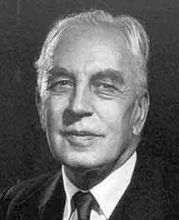 Last Sunday, March 10, but in 1937, English historian Arnold J. Toynbee wrote: “In this really very brief period of less than 2,000 years Christianity has, in fact, produced greater spiritual effects in the world than have been produced in a comparable space of time by any other spiritual movement that we know of in history.” The claim was made in an article entitled “The Menace of the New Paganism,” published in Christian Century on that date. Arnold Joseph Toynbee, who lived from 1889-1975, was a noted British historian whose 12-volume 1934-1961 analysis of the rise and fall of civilizations, A Study of History, is the chief religious apology for the social record of Christianity in the West. Toynbee attributes the decline of civilizations to spiritual decay – “the idolatrous worship of organized human power” – preferring to overlook such earthly factors as militarism, ecology and economics. So did “the common fatherhood of God [create] a brotherhood between all the human citizens” in Western society? The chief claims for the effect of Christianity on Western society, made by most such apologists, boil down to the assertions that Christianity protected children, gave the world schools
and hospitals
, improved the social status of women, ended slavery and elevated morality. Each one of these claims is demonstrably false.
Last Sunday, March 10, but in 1937, English historian Arnold J. Toynbee wrote: “In this really very brief period of less than 2,000 years Christianity has, in fact, produced greater spiritual effects in the world than have been produced in a comparable space of time by any other spiritual movement that we know of in history.” The claim was made in an article entitled “The Menace of the New Paganism,” published in Christian Century on that date. Arnold Joseph Toynbee, who lived from 1889-1975, was a noted British historian whose 12-volume 1934-1961 analysis of the rise and fall of civilizations, A Study of History, is the chief religious apology for the social record of Christianity in the West. Toynbee attributes the decline of civilizations to spiritual decay – “the idolatrous worship of organized human power” – preferring to overlook such earthly factors as militarism, ecology and economics. So did “the common fatherhood of God [create] a brotherhood between all the human citizens” in Western society? The chief claims for the effect of Christianity on Western society, made by most such apologists, boil down to the assertions that Christianity protected children, gave the world schools
and hospitals
, improved the social status of women, ended slavery and elevated morality. Each one of these claims is demonstrably false.
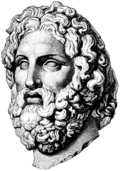 (1) It is claimed that Christianity abolished the practices of abortion, the exposure (or abandoning) of children, and infanticide. In fact, these practices were rare and condemned by the pagan legislature. The historian Mommsen wrote, “The moral obligations of parents toward their children were fully and deeply felt by the Roman nation.”
(1) It is claimed that Christianity abolished the practices of abortion, the exposure (or abandoning) of children, and infanticide. In fact, these practices were rare and condemned by the pagan legislature. The historian Mommsen wrote, “The moral obligations of parents toward their children were fully and deeply felt by the Roman nation.”
(2) Ancient Rome, by the second half of the fourth century, had provided quite a good, free, public education system and St. Augustine himself was a product of this public education. Let’s put it starkly: by 400, via Imperial Decree, Christianity became the official religion of the Roman Empire; by 500, not a trace of pagan schools remained – and nothing replaced them for a thousand years.
(3) Like the fundamentalists in our day who attack Planned Parenthood centers that offer reproductive services, and occasionally abortion, Christians of Ancient Rome persisted in destroying temples of Aesculapius (the god of healing), the very places where medical services were offered for free to the poor. Christian clerics fought quinine, anesthetics, sanitation education, the compassionate treatment of the insane, and practically every other form of mercy toward the sick. Like AIDS in our day, when the Black Plague swept Europe (1348-1350), claiming an estimated 100 million lives, churchmen dismissed it as God’s punishment for not obeying the Church.
(4) Christianity found women free and respected under the Roman Empire, and degraded her to the position of chattel and virtual slave throughout the next 1400 years. The extension to Western women of the right to vote was not allowed until the early 1900s. As for the other rights women enjoy in our secular world, you will look in vain to find them from the years 500 to 1800, during which the churches had their most influence in the Western world.
(5) Slavery has existed throughout history, including during the time of the Roman Empire, but Greek and Roman social moralists recognized the injustice of slavery and quite often denounced it. After Rome fell and until the 800s, no Christian cleric of any importance or influence denounced slavery. There is no condemnation of slavery in the Bible, so there was no incentive during the early Christian Era to abolish it. During the Christian Middle Ages, workers were much worse off than under the slave system of Rome, because nearly everyone in Europe was a serf, which is slavery with fewer rights: when the Empire fell, legal protections for slaves fell with it. Slavery would not be abolished for another 1,000 years.
(6) The Age of Faith was an Age of Immorality: of crime, scandalous iniquity, and gross cruelty. Under the Stoic-Epicurean philosophy prevalent in Ancient Rome, there were no more prostitutes than in modern Chicago (and at least they had a union); just as much, or as little, drunkenness. But in Christian Europe, after the fall of Rome, the clergy, and even the popes, were nearly all immoral and some even owned brothels. After 1,400 years of Christian failure, the modern secular age made the world better because of “the idolatrous worship of organized human power.”
 Last Monday, March 11, but in 1959, American erotic film star Nina Hartley was born. Born Marie Hartman into a secular Jewish family, she was educated in nursing and graduated with highest honors in 1985. Her first foray into the erotic arts was working as a stripper, then made her first of over 400 pornographic films, Educating Nina, in 1984. She also sells a line of “Nina Hartley’s Guide” sexual instruction videos. Still active in the industry, Hartley once quipped, “Now I work with women who are younger than my breast implants.” Politically, Hartley considers herself a humanist, a liberal and an outspoken sex-positive feminist. Her-sex-positive attitude naturally puts Hartley at odds with Christianity, Judaism and Islam. “Religion wasn’t much discussed and we never went to church or temple,” says Hartley about her childhood. “We were taught social justice at home. … There was never any mention of God as a reason to do right. It was just the right thing to do. I feel strongly to this day that right and religion don’t necessarily go hand in hand.” As for her feminist side intersecting with her atheism, Hartley says, “In a nutshell: my body, my rules. Other women don’t get to tell me what’s “right” for me, just as no imam, rabbi, priest or minister gets to tell me what to do with my body.” From a Q&A on her personal website, Hartley makes it clear: “No, I don’t believe in God. I was raised with no religion, but a lot of morals. I definitely think that sex is natural and healthy, and that people have the absolute right to pursue their sexual preferences with other consenting adults without government or church intervention.”
Last Monday, March 11, but in 1959, American erotic film star Nina Hartley was born. Born Marie Hartman into a secular Jewish family, she was educated in nursing and graduated with highest honors in 1985. Her first foray into the erotic arts was working as a stripper, then made her first of over 400 pornographic films, Educating Nina, in 1984. She also sells a line of “Nina Hartley’s Guide” sexual instruction videos. Still active in the industry, Hartley once quipped, “Now I work with women who are younger than my breast implants.” Politically, Hartley considers herself a humanist, a liberal and an outspoken sex-positive feminist. Her-sex-positive attitude naturally puts Hartley at odds with Christianity, Judaism and Islam. “Religion wasn’t much discussed and we never went to church or temple,” says Hartley about her childhood. “We were taught social justice at home. … There was never any mention of God as a reason to do right. It was just the right thing to do. I feel strongly to this day that right and religion don’t necessarily go hand in hand.” As for her feminist side intersecting with her atheism, Hartley says, “In a nutshell: my body, my rules. Other women don’t get to tell me what’s “right” for me, just as no imam, rabbi, priest or minister gets to tell me what to do with my body.” From a Q&A on her personal website, Hartley makes it clear: “No, I don’t believe in God. I was raised with no religion, but a lot of morals. I definitely think that sex is natural and healthy, and that people have the absolute right to pursue their sexual preferences with other consenting adults without government or church intervention.”
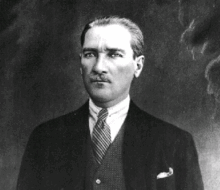 Last Tuesday, March 12*, but in 1881, the future President of the (secular) Republic of Turkey, Mustafa Kemal Atatürk, was born. Mustafa was dubbed “Kemal” (meaning “perfection” or “maturity”) by his mathematics teacher. In his early years, he absorbed liberal ideas from his Turkish father. He led the Turkish national movement in the Turkish War of Independence, following the defeat of the Ottoman Empire in World War I. Mustafa Kemal became a national hero as a result of the Battle of Gallipoli in 1915. On 29 October 1923, Turkey became a Republic with Mustapha Kemal its first President. With dictatorial powers, Atatürk instituted political, economic, and cultural reforms, including a parliamentary democracy that borrowed heavily from the American, French and British models. In 1926 he separated secular law from Islamic law, and restricted the latter to purely religious matters. As the Muslim partisans raised revolts in the provinces, Atatürk broke their power in order to secularize and modernize the country. His secularization of Turkey included the education of women, outlawing the veil, and giving women equal rights to divorce, property ownership and inheritance. For turning a Muslim state into a secular state, he earned the name Atatürk (“father of the Turks”). The Turkish military regards itself as the custodians of Atatürk's legacy – Atatürk had great contempt for all religion – and on four occasions it has overthrown the government in a military coup when it felt secularism was being undone, each time returning power to a civilian government. As he was a complete skeptic, Atatürk claimed that his only standard was the good of Turkey. It was the atheist Mustafa Kemal Atatürk who said, “Our true mentor in life is science.”
Last Tuesday, March 12*, but in 1881, the future President of the (secular) Republic of Turkey, Mustafa Kemal Atatürk, was born. Mustafa was dubbed “Kemal” (meaning “perfection” or “maturity”) by his mathematics teacher. In his early years, he absorbed liberal ideas from his Turkish father. He led the Turkish national movement in the Turkish War of Independence, following the defeat of the Ottoman Empire in World War I. Mustafa Kemal became a national hero as a result of the Battle of Gallipoli in 1915. On 29 October 1923, Turkey became a Republic with Mustapha Kemal its first President. With dictatorial powers, Atatürk instituted political, economic, and cultural reforms, including a parliamentary democracy that borrowed heavily from the American, French and British models. In 1926 he separated secular law from Islamic law, and restricted the latter to purely religious matters. As the Muslim partisans raised revolts in the provinces, Atatürk broke their power in order to secularize and modernize the country. His secularization of Turkey included the education of women, outlawing the veil, and giving women equal rights to divorce, property ownership and inheritance. For turning a Muslim state into a secular state, he earned the name Atatürk (“father of the Turks”). The Turkish military regards itself as the custodians of Atatürk's legacy – Atatürk had great contempt for all religion – and on four occasions it has overthrown the government in a military coup when it felt secularism was being undone, each time returning power to a civilian government. As he was a complete skeptic, Atatürk claimed that his only standard was the good of Turkey. It was the atheist Mustafa Kemal Atatürk who said, “Our true mentor in life is science.”
*[Wikipedia has Atatürk’s birthdate as 19 May 1881, possibly based on MKA’s own choice, although his mother recalled giving birth to him in a colder season, in 1296 on the Rumi/Islamic calendar, making his birthdate as late as 12 March 1881. Biography.com uses the date I have used here. The true date may never be known.]
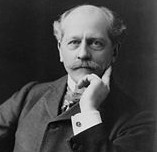 Last Wednesday, March 13, but in 1855, American businessman and astronomer Percival Lowell was born. Lowell graduated from Harvard University in 1876, but chose to assure his finances by running a cotton mill, managing trust funds, and making wise investments. By the time he was 28, he had made his fortune and never had to work again. Using his wealth and influence, Lowell dedicated himself to astronomy, founding the observatory which bears his name in Flagstaff, Arizona, in 1894. During the last decade of his life, Lowell devoted his efforts to the search for a hypothetical planet beyond Neptune, Planet X. Although Lowell did not discover Pluto, the Lowell Observatory did photograph Pluto in March and April 1915 and the discovery was made later by observing discrepancies between photos in 1930. This earned a sort of naming right, formed of his initials, PL, for Percival Lowell’s greatest contribution to planetary studies. (In 2006, Pluto was reclassified as a dwarf planet by the International Astronomical Union.) Lowell travelled extensively in Asia in the 1880s, spending ten years in Japan, resulting in a popular 1888 book, The Soul of the Far East, which suggested that human progress there is a function of individuality and imagination, not religious culture, which is why Christianity often fails there. “The Roman Catholic who prays to a wooden image of Christ is not one whit less idolatrous than the Buddhist who worships a bronze statue of Amida Butzu,” he wrote. Noting that the notion of immortality holds no great attraction in the Far East, Lowell also wrote, “Among such a people personal Christianity converts but few. They accept our material civilization, but they reject our creeds. To preach a prolongation of life appears to them like preaching an extension of sorrow. At most, Christianity succeeds only in making them doubters of what lies beyond this life.”
Last Wednesday, March 13, but in 1855, American businessman and astronomer Percival Lowell was born. Lowell graduated from Harvard University in 1876, but chose to assure his finances by running a cotton mill, managing trust funds, and making wise investments. By the time he was 28, he had made his fortune and never had to work again. Using his wealth and influence, Lowell dedicated himself to astronomy, founding the observatory which bears his name in Flagstaff, Arizona, in 1894. During the last decade of his life, Lowell devoted his efforts to the search for a hypothetical planet beyond Neptune, Planet X. Although Lowell did not discover Pluto, the Lowell Observatory did photograph Pluto in March and April 1915 and the discovery was made later by observing discrepancies between photos in 1930. This earned a sort of naming right, formed of his initials, PL, for Percival Lowell’s greatest contribution to planetary studies. (In 2006, Pluto was reclassified as a dwarf planet by the International Astronomical Union.) Lowell travelled extensively in Asia in the 1880s, spending ten years in Japan, resulting in a popular 1888 book, The Soul of the Far East, which suggested that human progress there is a function of individuality and imagination, not religious culture, which is why Christianity often fails there. “The Roman Catholic who prays to a wooden image of Christ is not one whit less idolatrous than the Buddhist who worships a bronze statue of Amida Butzu,” he wrote. Noting that the notion of immortality holds no great attraction in the Far East, Lowell also wrote, “Among such a people personal Christianity converts but few. They accept our material civilization, but they reject our creeds. To preach a prolongation of life appears to them like preaching an extension of sorrow. At most, Christianity succeeds only in making them doubters of what lies beyond this life.”
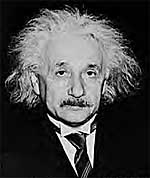 Last Thursday, March 14, but in 1879, the German-American theoretical physicist who developed the general theory of relativity, Albert Einstein was born. Although accused of being an atheist by none other than William Henry Cardinal O’Connell, archbishop of Boston, Einstein avoided the word, saying instead, in a letter to an admirer, on 24 March 1954, “I do not believe in a personal God and I have never denied this but have expressed it clearly. If something is in me which can be called religious then it is the unbounded admiration for the structure of the world so far as our science can reveal it.” On science and prayer, in 1936 Einstein wrote, “Scientific research is based on the idea that everything that takes place is determined by laws of nature, and therefore this holds for the actions of people. For this reason, a research scientist will hardly be inclined to believe that events could be influenced by a prayer, i.e. by a wish addressed to a supernatural Being.” In answer to Cardinal O’Connell’s charge, Dr. Einstein said, “I believe in Spinoza’s God, who reveals himself in the orderly harmony of what exists, not in a God who concerns himself with the fates and actions of human beings.” One week before his death in 1955, Einstein signed a letter to Bertrand Russell in which he agreed that his name should go on a manifesto urging all nations to give up nuclear weapons.
Last Thursday, March 14, but in 1879, the German-American theoretical physicist who developed the general theory of relativity, Albert Einstein was born. Although accused of being an atheist by none other than William Henry Cardinal O’Connell, archbishop of Boston, Einstein avoided the word, saying instead, in a letter to an admirer, on 24 March 1954, “I do not believe in a personal God and I have never denied this but have expressed it clearly. If something is in me which can be called religious then it is the unbounded admiration for the structure of the world so far as our science can reveal it.” On science and prayer, in 1936 Einstein wrote, “Scientific research is based on the idea that everything that takes place is determined by laws of nature, and therefore this holds for the actions of people. For this reason, a research scientist will hardly be inclined to believe that events could be influenced by a prayer, i.e. by a wish addressed to a supernatural Being.” In answer to Cardinal O’Connell’s charge, Dr. Einstein said, “I believe in Spinoza’s God, who reveals himself in the orderly harmony of what exists, not in a God who concerns himself with the fates and actions of human beings.” One week before his death in 1955, Einstein signed a letter to Bertrand Russell in which he agreed that his name should go on a manifesto urging all nations to give up nuclear weapons.
 Yesterday, March 15, but in 2004, the French “headscarf ban” became law. French President Jacques Chirac signed a law banning large symbols of religious affiliation in public schools. Known in most of the news outlets outside of France as the “French Headscarf Ban,” the law restricts in public primary and secondary schools any visible religious symbols such as Muslim head scarves, Sikh turbans and Jewish yarmulkes, but exempted small Christian crosses and small Stars of David. Because nuance is as foreign to Americans as white bread is to the French, these distinctions were seen by many in the US and around the world as discriminatory against French Muslims – even as French natives view Muslim religious garb as “un-French,” but Americans are not shy about prescribing what is un-American. Why do young Muslim women wear the headscarf? Some see it as a way to preserve their modesty. Some see it as a form of liberation form the sexualization of society. But many see the true reason, since no man wears one: as a patriarchal mandate to keep women hidden and subservient. The law came into effect with the new school year on 2 September 2004 and caused a strong cry from Muslims all over the world. Not only were there protests in Paris, there were also protests in other European cities and other countries, especially Muslim countries, worldwide. But the objections are desperate special pleading: the French have the right to define what is French and what is not, the French have laws requiring the public sphere to be strictly neutral with regard to religion (with their own history on their side), and, what is most important, no society an survive if a minority can dictate policy to the majority. The French appear to have it right. There is one culture in France and it is French. Multiculturalism drives culture to its death.
Yesterday, March 15, but in 2004, the French “headscarf ban” became law. French President Jacques Chirac signed a law banning large symbols of religious affiliation in public schools. Known in most of the news outlets outside of France as the “French Headscarf Ban,” the law restricts in public primary and secondary schools any visible religious symbols such as Muslim head scarves, Sikh turbans and Jewish yarmulkes, but exempted small Christian crosses and small Stars of David. Because nuance is as foreign to Americans as white bread is to the French, these distinctions were seen by many in the US and around the world as discriminatory against French Muslims – even as French natives view Muslim religious garb as “un-French,” but Americans are not shy about prescribing what is un-American. Why do young Muslim women wear the headscarf? Some see it as a way to preserve their modesty. Some see it as a form of liberation form the sexualization of society. But many see the true reason, since no man wears one: as a patriarchal mandate to keep women hidden and subservient. The law came into effect with the new school year on 2 September 2004 and caused a strong cry from Muslims all over the world. Not only were there protests in Paris, there were also protests in other European cities and other countries, especially Muslim countries, worldwide. But the objections are desperate special pleading: the French have the right to define what is French and what is not, the French have laws requiring the public sphere to be strictly neutral with regard to religion (with their own history on their side), and, what is most important, no society an survive if a minority can dictate policy to the majority. The French appear to have it right. There is one culture in France and it is French. Multiculturalism drives culture to its death.
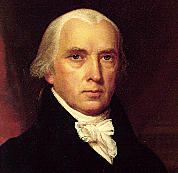 Today, March 16, but in 1751, that the man who would become the fourth President of the United States, James Madison, was born. Sixteen years after graduating Princeton, where he studied religion and history as well as law, Madison represented Virginia at the Constitutional Convention. Among the founders, Madison wielded great influence in its drafting, and, with Alexander Hamilton and John Jay, explained much of it in the Federalist Papers. The Constitution that emerged in 1789 contained a First Amendment guaranteeing freedom of religion that was achieved largely through Madison’s influence. But did Madison mean for that amendment to apply to the individual states? “No state,” wrote Madison, “shall infringe the equal rights of conscience, nor the freedom of speech, or of the press, nor of the right of trial by jury in criminal cases.” Grateful Americans made Madison a two-term President, from 1809-1817. On religion, Madison allowed that, “There appears to be in the nature of a man what ensures his belief in an invisible cause of his present existence and an anticipation of his future existence.” Unbiased scholars say that Madison was “no more than conventionally religious” and that he later became a Deist. His clearest declarations are in his Memorial and Remonstrance of 1785. In it, Madison pointed out that, “Because we hold it for a fundamental and undeniable truth, ‘that religion or the duty which we owe to our Creator and the manner of discharging it, can be directed only by reason and conviction, not by force or violence.’ The Religion then of every man must be left to the conviction and conscience of every man; and it is the right of every man to exercise it as these may dictate.” It was James Madison’s mature opinion that religion and government should remain separate, neither one supporting the other.
Today, March 16, but in 1751, that the man who would become the fourth President of the United States, James Madison, was born. Sixteen years after graduating Princeton, where he studied religion and history as well as law, Madison represented Virginia at the Constitutional Convention. Among the founders, Madison wielded great influence in its drafting, and, with Alexander Hamilton and John Jay, explained much of it in the Federalist Papers. The Constitution that emerged in 1789 contained a First Amendment guaranteeing freedom of religion that was achieved largely through Madison’s influence. But did Madison mean for that amendment to apply to the individual states? “No state,” wrote Madison, “shall infringe the equal rights of conscience, nor the freedom of speech, or of the press, nor of the right of trial by jury in criminal cases.” Grateful Americans made Madison a two-term President, from 1809-1817. On religion, Madison allowed that, “There appears to be in the nature of a man what ensures his belief in an invisible cause of his present existence and an anticipation of his future existence.” Unbiased scholars say that Madison was “no more than conventionally religious” and that he later became a Deist. His clearest declarations are in his Memorial and Remonstrance of 1785. In it, Madison pointed out that, “Because we hold it for a fundamental and undeniable truth, ‘that religion or the duty which we owe to our Creator and the manner of discharging it, can be directed only by reason and conviction, not by force or violence.’ The Religion then of every man must be left to the conviction and conscience of every man; and it is the right of every man to exercise it as these may dictate.” It was James Madison’s mature opinion that religion and government should remain separate, neither one supporting the other.
Other birthdays and events this week—
March 11: British humorist and author of The Hitchhiker’s Guide to the Galaxy, Douglas Adams was born (1952).
March 12: Canadian-born American scientist Simon Newcomb was born (1835).
March 12: Italian poet, journalist, novelist and dramatist Gabriele D’Annunzio was born (1863).
March 12: Italian jurist, philosopher and political reformer Cesare Beccaria was born (1738).
We can look back, but the Golden Age of Freethought is now. You can find full versions of these pages in Freethought history at the links in my blog, FreethoughtAlmanac.com.

